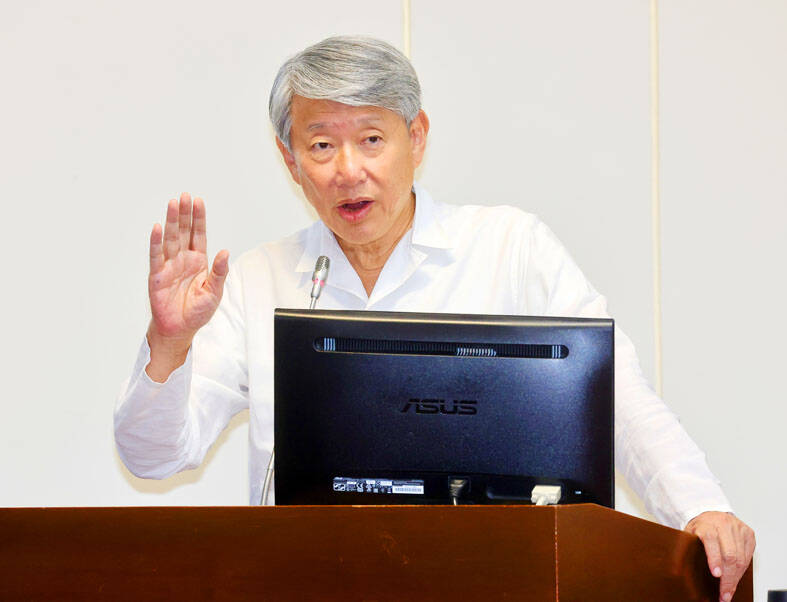Taiwan hopes to secure a competitive tariff rate with the US by leveraging Taiwan Semiconductor Manufacturing Co’s (TSMC, 台積電) US$165 billion investment in the US, Minister of Economic Affairs J.W. Kuo (郭智輝) said yesterday.
Compared with Japan and South Korea, Taiwan could secure a more favorable tariff rate due to TSMC’s investment, Kuo told a meeting of the legislature’s Economics Committee in Taipei.
The US on July 7 announced a 25 percent tariff on Japan and South Korea, which is scheduled to take effect on Aug. 1.

Photo: CNA
Vice Premier Cheng Li-chiun (鄭麗君) is leading a delegation to the US this week for a fourth round of tariff negotiations, Kuo said, adding that the ministry hopes the delegation could secure a rate favorable to local businesses and better than those offered to competitors.
Meanwhile, Democratic Progressive Party Legislator Chiu Chih-wei (邱志偉) urged the ministry to refute allegations that the government had received a 32 percent US tariff notice, but is withholding information until after recall elections.
Kuo agreed, saying he had no idea where the allegations originated.
The government would strive to secure a better rate, Kuo said, adding that the US has suggested that the deadline could be extended if no deal is reached.
It is important to understand US President Donald Trump’s negotiation style, he said.
Taiwanese products, particularly semiconductors, which are impacted by the investigation launched by the US under Section 232 of the US Trade Expansion Act, are vital to the US, Kuo said.
The US has high expectations for Taiwan’s export controls and border protection in the tariff negotiations, and is closely watching legislative debates over proposed cuts to defense and coast guard budgets, he said.
The ministry is also considering increasing natural gas imports from Alaska, as US investment and Trump’s “Make America Great Again” motto remain key themes in the tariff negotiations, he added.
“As there is still much to be invested, we must weigh whether the investment is necessary and whether it is a long-term commitment or a short-term transaction. I believe our delegation understands that clearly,” Kuo said.
Natural gas from the US made up about 10 percent of Taiwan’s total energy imports, and the ministry aims to raise that to 20 to 30 percent, he said in April, adding that Taiwan also plans to invest about NT$200 billion (US$6.8 billion) in advanced US technologies over 10 years.

SEMICONDUCTOR SERVICES: A company executive said that Taiwanese firms must think about how to participate in global supply chains and lift their competitiveness Taiwan Semiconductor Manufacturing Co (TSMC, 台積電) yesterday said it expects to launch its first multifunctional service center in Pingtung County in the middle of 2027, in a bid to foster a resilient high-tech facility construction ecosystem. TSMC broached the idea of creating a center two or three years ago when it started building new manufacturing capacity in the US and Japan, the company said. The center, dubbed an “ecosystem park,” would assist local manufacturing facility construction partners to upgrade their capabilities and secure more deals from other global chipmakers such as Intel Corp, Micron Technology Inc and Infineon Technologies AG, TSMC said. It

NO BREAKTHROUGH? More substantial ‘deliverables,’ such as tariff reductions, would likely be saved for a meeting between Trump and Xi later this year, a trade expert said China launched two probes targeting the US semiconductor sector on Saturday ahead of talks between the two nations in Spain this week on trade, national security and the ownership of social media platform TikTok. China’s Ministry of Commerce announced an anti-dumping investigation into certain analog integrated circuits (ICs) imported from the US. The investigation is to target some commodity interface ICs and gate driver ICs, which are commonly made by US companies such as Texas Instruments Inc and ON Semiconductor Corp. The ministry also announced an anti-discrimination probe into US measures against China’s chip sector. US measures such as export curbs and tariffs

The US on Friday penalized two Chinese firms that acquired US chipmaking equipment for China’s top chipmaker, Semiconductor Manufacturing International Corp (SMIC, 中芯國際), including them among 32 entities that were added to the US Department of Commerce’s restricted trade list, a US government posting showed. Twenty-three of the 32 are in China. GMC Semiconductor Technology (Wuxi) Co (吉姆西半導體科技) and Jicun Semiconductor Technology (Shanghai) Co (吉存半導體科技) were placed on the list, formally known as the Entity List, for acquiring equipment for SMIC Northern Integrated Circuit Manufacturing (Beijing) Corp (中芯北方積體電路) and Semiconductor Manufacturing International (Beijing) Corp (中芯北京), the US Federal Register posting said. The

India’s ban of online money-based games could drive addicts to unregulated apps and offshore platforms that pose new financial and social risks, fantasy-sports gaming experts say. Indian Prime Minister Narendra Modi’s government banned real-money online games late last month, citing financial losses and addiction, leading to a shutdown of many apps offering paid fantasy cricket, rummy and poker games. “Many will move to offshore platforms, because of the addictive nature — they will find alternate means to get that dopamine hit,” said Viren Hemrajani, a Mumbai-based fantasy cricket analyst. “It [also] leads to fraud and scams, because everything is now